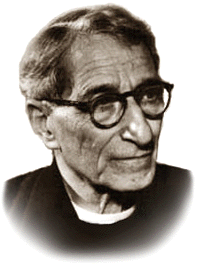...Best of Sicily presents... Best of Sicily Magazine. ... Dedicated to Sicilian art, culture, history, people, places and all things Sicilian. |
by Vincenzo Salerno | ||
Magazine Index Best of Sicily Arts & Culture Fashion Food & Wine History & Society About Us Travel Faqs Contact Map of Sicily |
Born to a prosperous family of Caltagirone in 1871, Luigi Sturzo was ordained in 1896 and then studied in Rome. In 1900 he was one of the founders of an early "Christian democratic" movement in an Italy which was not overwhelmingly democratic. He left this early movement in 1919 to establish the Popular Party. By that time he was head of Catholic Action, a an organisation of the Catholic Church. Sturzo served as mayor of Caltagirone from 1905 until 1920, but his influence far transcended that Sicilian city because he was one of the leaders of what, by 1920, was an influential national political party. The Fascists despised him, and in 1924 Sturzo, fearing for his life, fled into exile, first to London and then to New York. He returned following the war and the party he founded decades earlier became the mainstream Christian Democrats. It has been observed that Sturzo became somewhat reactionary in the early 1950s (when he wrote several books critical of specific movements then prevalent in Italy), perhaps as a reaction to the excesses the Communists and Socialists, as well as certain upstart Christian Democrats who just a few years earlier had supported Fascism, but he was never part of the Extreme Right. In what little spare time he had, Luigi Sturzo collected antique ceramic art --long before the Sicilian renaissance in this field. In fact, Sturzo was one of the people responsible for the rebirth of the decorative pottery industry at Caltagirone, where, as mayor, he established a ceramicists' school in 1918. At the time, when only a handful of aging ceramicists were left in Caltagirone, many cynical and narrow-minded local residents protested (even disdained) this initiative, yet today majolica art is the principal industry in this remote mountain village. Luigi Sturzo was made a life senator in 1952. He died seven years later. About the Author: Palermo native Vincenzo Salerno has written biographies of several famous Sicilians, including Frederick II and Giuseppe di Lampedusa. | |
Top of Page |
 The clergy has not always been welcome in politics,
but what better arena in which to work for social change? Of course, it's
a different story when a priest actually becomes a politician. The charismatic
Luigi Sturzo was a Roman Catholic priest who sought to aid the poor masses
of Italy during the early decades of the twentieth century. That this eventually
brought him into official disfavour with the Fascist authorities says much
about the virtues of his movement.
The clergy has not always been welcome in politics,
but what better arena in which to work for social change? Of course, it's
a different story when a priest actually becomes a politician. The charismatic
Luigi Sturzo was a Roman Catholic priest who sought to aid the poor masses
of Italy during the early decades of the twentieth century. That this eventually
brought him into official disfavour with the Fascist authorities says much
about the virtues of his movement.